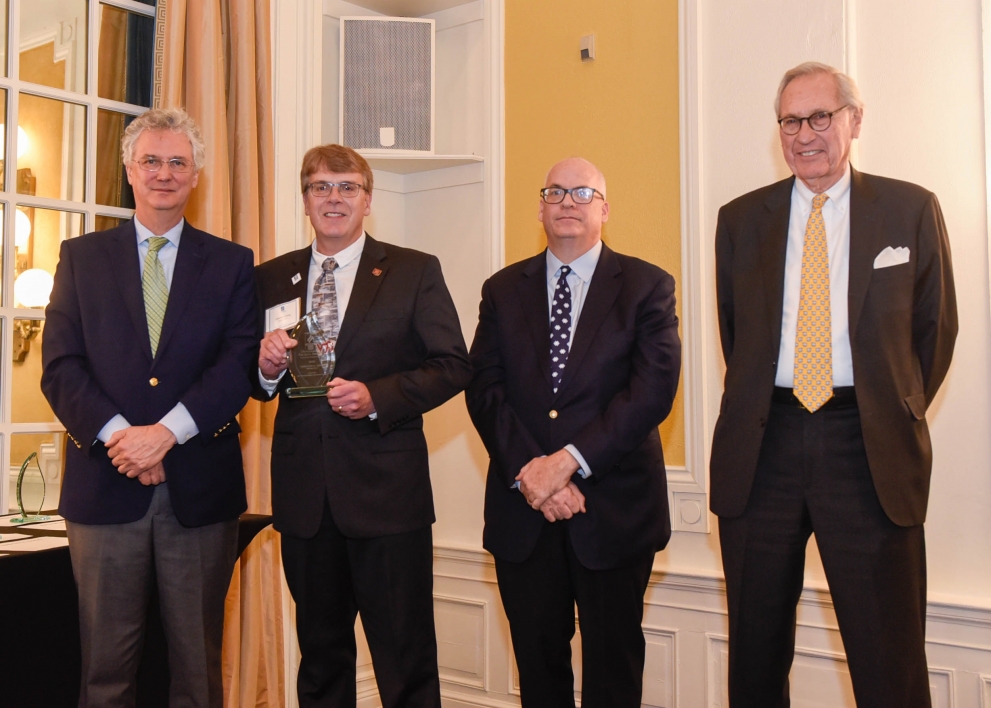Professor's work on polymers recognized through NSF grant and American Chemical Society Award

“I love plastics. I love materials,” said ASU Professor Tim Long. “But I don’t want my legacy to be a piece of plastic floating in the water. I want to address the plastic crisis for our nation and the world.”
Products manufactured using plastics, foams and other polymers are used around the world. Globally, over 660 billion pounds of polymers are produced every year for use in homes, cars, furniture, airplanes, ships, machinery, computers and many other products. However, only about 10% of these polymers are recycled in the United States, resulting in massive amounts of waste.
The problem is immense; the impact of a solution is equally immense.
To tackle this and other challenges, Arizona State University's Tim Long, professor in the School of Molecular Sciences and director of the ASU Biodesign Center for Sustainable Macromolecular Materials and Manufacturing, brings together research in chemistry, chemical engineering, health sciences and mechanical engineering.
The American Chemical Society recently recognized Long’s commitment to excellence in higher education and polymer research through the 2022 Paul J. Flory Award, named in honor of the late Nobel laureate in chemistry.
Long came to ASU in 2020, building on a successful 20-year career at Virginia Tech where he rose through the ranks, ultimately creating and directing the Macromolecules Innovation Institute. Now, serving jointly in the ASU School of Molecular Sciences and the Ira A. Fulton Schools of Engineering, Long works to transform research success into societal success.
Although Long designs innovate materials based on polymer chemistry, his passion is using his knowledge and skill to solve global problems.
“I love plastics. I love materials,” Long said. “But I don’t want my legacy to be a piece of plastic floating in the water. I want to address the plastic crisis for our nation and the world.”
Long believes that we should not only be good at making polymers, but we should also be good at unmaking them so these materials can be reused rather than lying in a landfill. This often includes partnerships.
Long recently met with Habitat for Humanity to explore the 3D printing of homes. He also started a partnership with Mayo Clinic looking at ways to recycle medical waste, such as plastic waste generated as a result of the COVID-19 pandemic. Additionally, Long’s research group was recently awarded a $1.9 million grant from the National Science Foundation, partnering with adidas AG, to reduce foam waste.
“ASU is uniquely positioned to tackle these challenges,” Long said. “Through collaborations between SMS (School of Molecular Sciences) and the Fulton Schools of Engineering, together with community and industrial partners, my goal is to quickly position the School of Molecular Sciences as a top-five program in macromolecular science and engineering to solve these important challenges. ASU brings these facets, with the convergence of an interdisciplinary research culture coupled with a passion to engage the local community. That’s why I’m here, to nucleate these partnerships.”
Tim Long (second from left) receives the 2020 Outstanding Faculty Award from the State Council of Higher Education for Virginia.
Key to Long’s approach is the development of the next generation of researchers. His graduates continue to positively impact sustainability around the world, such as Proctor and Gamble Senior Scientist John Layman; Ann Fornof, a polymer scientist at 3M; Joseph Dennis of the Army Research Laboratories in Chicago; and Keren Zhang, who worked at Dupont but now works at Facebook to bring advanced materials to the company.
"I’m an interdisciplinary researcher,” Long said. “I enjoy speaking the different languages of science and engineering, searching for new intersections for discovery. I want to make an impact on this world while I educate students to create a sustainable future.”
“Macromolecular science and engineering continue to catalyze future technologies and tackle grand challenges of our times, from new sensors with superior sensitivity and selectivity for health care to enabling chemical and biological processes that address climate change," said Tijana Rajh, director of the School of Molecular Sciences. "SMS together with the Biodesign Institute under the leadership of Tim Long and his team is positioning SMS at the forefront of these future research directions.”
More Science and technology

ASU water polo player defends the goal — and our data
Marie Rudasics is the last line of defense.Six players advance across the pool with a single objective in mind: making sure that…

Diagnosing data corruption
You are in your doctor’s office for your annual physical and you notice the change. This year, your doctor no longer has your…
Large-scale study reveals true impact of ASU VR lab on science education
Students at Arizona State University love the Dreamscape Learn virtual reality biology experiences, and the intense engagement it…


